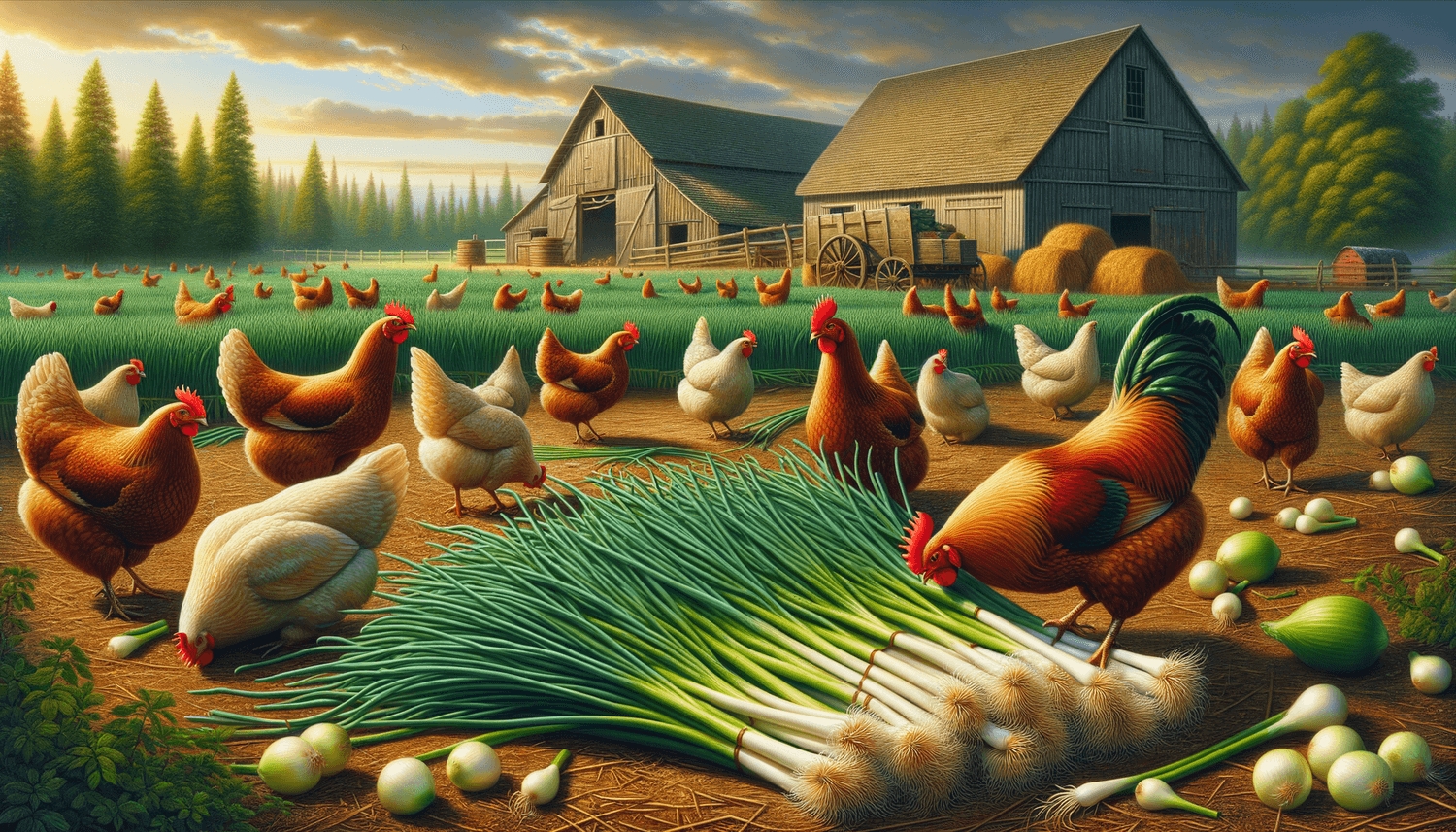Welcome to another clucking good post about the wonderful world of backyard chickens! Today, we find ourselves on a culinary exploration in the hen pen, as we ask the ever-important question: Can chickens eat scallions? In this post, we’ll crack open the delectable details about feeding scallions to your feathered friends. We’ll dish out the right portion of balanced diet, whisk in some nutritional value, and serve up the benefits and risks associated with this zesty veggie. And of course, we won’t forget to share our secret recipe for preparing these tasty tidbits for your chickens to enjoy. So sit back, grab a coop-side seat, and let’s get pecking at the scallion situation!
Can chickens eat scallions?
Yes, chickens can eat scallions, but in moderation. Scallions are safe for chickens to consume and can provide them with some essential nutrients. However, it is important to limit the amount of scallions in their diet due to the presence of thiosulfinates, which can cause digestive issues if consumed in large quantities.
A balanced diet for your backyard chickens
Just like us humans, chickens need a balanced diet to ensure they receive essential nutrients for optimal growth, egg production, and overall health. A chicken’s nutritional needs may differ from ours, but one thing remains the same: the importance of providing a well-rounded diet. The main course for any chicken’s meal should be high-quality chicken feed, which will provide the necessary vitamins, minerals, and proteins they require on a daily basis.
Chicken feed should make up around 80-90% of their diet, as it is specifically formulated to meet their unique dietary needs. For the remaining 10-20% of their diet, chickens can enjoy a delectable array of treats, including fruits and vegetables. These treats not only offer added nutritional benefits, but they also add variety and enjoyment to your chicken’s diet. A balanced meal plan will contribute to the overall health and happiness of your feathered friends, keeping them clucking for more!
Nutritional value of scallions for chickens.
Feeding scallions to chickens provides them with a healthy boost of essential nutrients. Scallions, also known as green onions, contain a variety of vitamins and minerals that can benefit your backyard flock. They are low in calories, high in dietary fiber, and are known for their antioxidant properties that provide a myriad of health benefits.
Scallions are rich in vitamins A, C, and K, which contribute to the overall health of your chickens. Vitamin A is vital for maintaining healthy vision, growth, and reproduction, while vitamin C boosts the immune system and aids in the absorption of iron. Vitamin K, on the other hand, plays a crucial role in maintaining healthy blood clotting mechanisms. Additionally, scallions contain important minerals such as potassium and manganese, which are beneficial for proper nerve function and bone health, respectively.
Hydration is also a notable aspect of scallions, as they have a high water content. This can be particularly beneficial during hot summer days when chickens need extra hydration to combat the heat. All in all, incorporating scallions into your chicken’s diet not only adds palatable variety but also packs a nutritional punch that can contribute to your flock’s health and well-being.
Nutrition table of scallions for chickens.
| Information | Description |
|---|---|
| Nutritional Value | Scallions contain vitamins A, C and K, as well as minerals like potassium and manganese. |
| Suggested Serving Size | Feed in small amounts, incorporated into the 10-20% treat portion of a chicken’s diet. |
| Safe Feeding Practices | Introduce scallions gradually, and observe for any changes in chicken behavior or health. |
| Preparation | Wash and chop scallions into small pieces for easy consumption. |
| Potential Risks | Overfeeding may cause digestive issues due to the presence of thiosulfinates. |
| Hydration | High water content helps with hydration, especially during hot weather. |
| Digestion | Feeding in moderation can prevent any adverse effects on digestion. |
| Seasonal Availability | Available year-round, with spring and summer being the peak seasons. |
| Other Benefits | Antioxidant properties, boosts immune system, and supports bone health. |
Introducing scallions to your chickens
When adding scallions to your chicken’s diet, it’s essential to introduce them slowly and monitor your flock for any adverse reactions. Start with a small amount of chopped scallions, mixed with their regular feed or other familiar treats. Gradually increase the quantity as your chickens grow accustomed to the taste, while keeping an eye on their health and behavior for any changes. As always, ensure that your feathered friends have access to clean and fresh water at all times.
Rotating treats for variety
Chickens appreciate a diverse and exciting diet, which keeps them engaged and promotes good health. While scallions offer an excellent source of nutrients and hydration, like any other treat, it’s crucial to rotate them with other fruits and vegetables. This will ensure that your flock enjoys a variety of flavors and textures, and receives a well-rounded mix of nutrients.
Storing and sourcing scallions
When purchasing scallions for your chickens or your household, opt for fresh, firm, and brightly colored stocks. Be it your local grocery store, farmer’s market, or even your own garden, ensure you’re sourcing high-quality and pesticide-free produce. To store scallions for an extended period, wrap them in a damp paper towel, place them in a plastic bag, and refrigerate. This will help to prolong their freshness, allowing you to serve a scrumptious treat to your chickens whenever desired.
Final thoughts
Feeding scallions to your chickens can be a nutritious and flavorful addition to their diet, offering a host of health benefits. Remember to practice moderation, monitor your flock for any changes in behavior, and rotate treats to maintain variety in their meals. With these helpful tips in mind, you can keep your backyard chickens healthy, satisfied, and clucking with delight.

















